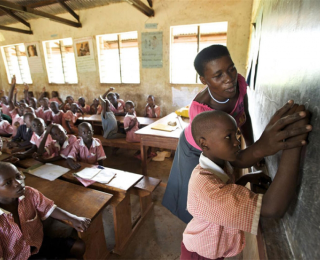At the time of independence, the question of education was brought to the fore.
Indeed, countries needed competent citizens in order to carry the economic development of the country. However, the economic situation was not favorable to an adequate development of the education systems. Faced with this observation, the international community has met on several occasions to reflect on ways to achieve the Millennium Development Goals.
The first major meeting for education took place in Jomtien in 1990, where the international community then adopted five orientations:
In 2000, the international community met again in Dakar with a single slogan “education for all” for the horizon 2015 and six objectives were retained:
Unfortunately, these objectives could only be partially achieved in 2015 despite numerous efforts on the part of the states and rather positive results overall.

A new appointment has been made with the Sustainable Development Goals (SDGs), of which SDG4 relates to education. This goal is even more ambitious than the education MDG. Indeed, it is no longer just a question of improving basic education, it is now a question of ensuring the possibility of equal access to quality learning opportunities at all levels of education. education for 2030.